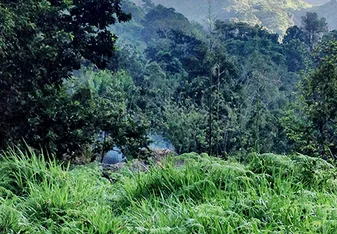High School Abroad in Uruguay
About
Located in the southeastern part of South America, Uruguay is most known for its role in peace-making initiatives, from its heavy involvement in the United Nations, to its freedom of press and access to reproductive healthcare.
Surrounded by coastlines of beautiful beaches, you'll get to experience a melting pot of cultural influences from Portugal, Spain, Brazil, and Argentina while spending high school abroad in Uruguay.
Uruguay is the perfect high school abroad destination for students who are interested in practicing their Spanish while being immersed in a culture whose history and current political drive lay down the groundwork for progressive legislation and international affairs.
Photo credit: caio 78.
Program Types
While in high school you could choose to attend one of the following program types in Uruguay:
- Summer Study Abroad
- Language Immersion
- Semester/Year Exchange
Summer Study Abroad
Spend six weeks of your summer in a classroom by the beach, practicing your Spanish language skills with your classmates, teachers, and locals alike. Out of the classroom excursions will give you the chance to get a real taste of life in Uruguay, as well as the rich history of the country.
Language Immersion
Students with intermediate levels of Spanish are welcome to enroll in an intensive summer language program, where the curriculum is solely taught in the native tongue. Aside from your assignments, you will also get the chance to put your Spanish language skills to use by living with a host family.
Semester/Year Exchange
Attend a local high school for a few months, to a year, while taking all of your core curriculum courses such as math, science, history, and language study. Your learning extends beyond the classroom with academic related excursions around the country, as well as local cultural events like soccer games, carnival, and shared meals with your host family.
Planning Your Trip
Popular Cities
- Montevideo: Uruguay's capital, where modernity meets history and European architecture. (Must walk along the Rambla!)
- Colonia de Sacramento: waterfront city with lots of culture and fresh seafood, just across the river from Buenos Aires in Argentina.
- Salto: natural hot springs, surrounded by beautiful landscapes.
- Punta del Este: one of the most popular beach resort cities in South America
Student Visas
The only students who will require a visa are those who attend a program that lasts longer than three months, meaning that summer program students will be fine with just their passports. Semester and year long exchange students will be required to get a student visa prior to entry into Uruguay, but program providers will assist students with this.
Uruguay enforces a departure fee when leaving the airport, but this fee is usually included in the cost of the airfare. In instances when it is not, travelers can pay this fee at the airport in USD or Uruguayan pesos.
Housing
Summer and semester/year exchange students alike will both get to live with a Uruguayan host family during their time overseas. This is a great opportunity for students to really learn about cultural traditions, food, and practice their language skills.
Costs
Compared to other countries in South America, Uruguay is relatively inexpensive to travel through. Currently, one UDS is equivalent to 29.1 Uruguayan pesos, though it is important to note that USD are widely accepted in touristy cities.
Students planning to enroll in a summer program can plan to spend $9,900, while semester programs cost $12,995 and year exchanges cost $13,595. These fees include airfare, tuition, housing, and three meals a day with a host family.
Packing Tips
Weather in Uruguay is decently mild, with winters (May to August) ranging from 40s-low 60s, and other seasons ranging from 60s-low 80s. Weather along the coast tends to be a little more intense and generally more damp in the winters.
We recommend packing the following:
- Sneakers
- Sandals
- Bathing suit
- Shorts and jeans
- A rain jacket
- A fleece or sweater
- A nice outfit or two
- Type I and sometimes C electrical plugs
Health & Safety
Vaccinations
Prior to entry into Uruguay, travelers must be vaccinated for Diphtheria, Hepatitis A, Malaria, Rabies, Tetanus, Typhoid, and Yellow Fever. Water in big cities is safe, though it is recommended that travelers drink bottled water in smaller, rural towns.
Safety
Uruguay is one of the safest countries in South America, almost absent of political corruption and the rallies that sometimes go hand in hand with that. Like many countries around the world, pickpocketing sometimes can be an issue in big cities, so it is recommended that travelers make copies of important documents like passports and credit cards.




















